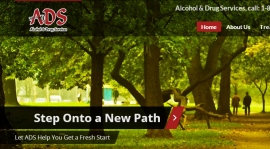 Treatment for addiction is one path which may be taken to help rebuild a person’s life when alcohol or drugs have become a problem. There is a compelling documentary recovery film recently out entitled The Anonymous People. The film is an interesting retrospective on the recovery movement in the United States and how it evolved, beginning with AA in the 1930’s, until present day.
Treatment for addiction is one path which may be taken to help rebuild a person’s life when alcohol or drugs have become a problem. There is a compelling documentary recovery film recently out entitled The Anonymous People. The film is an interesting retrospective on the recovery movement in the United States and how it evolved, beginning with AA in the 1930’s, until present day.
A special focus in the film is highlighting the message that people do recover from addiction, that there is a solution to this disease – and that solution is the decision to choose recovery. Recovery is a process that changes lives and takes individuals to a new destination in their life. Recovery is the journey that saves & enhances lives. To that end, recovery from addiction is of incomparable value.
In life, bad choices are made every day. As human beings, we learn to make better choices – often through the mistakes we endure as we travel through life one day at a time.
In reviewing the variety of recovery “paths”, there exist several routes by which an addicted person can find hope and direction in learning to live a drug free life. Some find their answers in church-based recovery programs. Churches recognize the reality of substance addictions and many have developed their own spiritual programs for dealing with drug addiction and offering hope for a better future.
12 Step Programs have been in widespread use for a long time and many lost in addiction have found the support, fellowship, and help needed in the rooms of AA, NA and other 12 step based programs. Some people in recovery from opioid addiction may find that their decision to take methadone or buprenorphine (suboxone) is not well-received in 12 step programs. This can make it difficult to feel accepted or supported there. However, not all NA or AA meetings are the same. NA and AA have themselves evolved over time, and some NA and AA members welcome all people suffering from addiction regardless of their drug of choice.
Addiction treatment is yet another path that leads toward recovery and the possibility of positive change. Treatment, like 12 step meetings, can vary considerably from one program to the next. Opioid treatment in particular often uses medication assistance as an additional tool to help people in their recovery journey. While medication assistance is scientifically proven to be beneficial to opioid addicted persons, it has endured some controversy through the years as those on the outside looking in chose judgment & criticism over compassion and understanding. Methadone and suboxone are proven, effective tools for alleviating the suffering that comes from opioid withdrawal.
In The Anonymous People documentary, there is a strong message that addicted people deserve love & support. Addicted people are from all walks of life. If treatment works, then advocating and supporting treatment is just and worthwhile. The film makes a persuasive argument that better advocacy is needed for the funding of addiction treatment services across the country. Addiction treatment advocacy has not been as effective as advocacy for other critical health conditions like HIV/AIDS or cancer.
As more families struggle with addiction and more voices are ultimately heard in their plea for treatment funding & support, we will hopefully see a shift in society whereby recovery is embraced as the answer to addiction.
 An article in Maine’s Bangor Daily News outlines a case recently decided in which the Town of Warren, Maine was found to have adopted an ordinance that was ruled discriminatory and in violation of the Americans With Disabilities Act.
An article in Maine’s Bangor Daily News outlines a case recently decided in which the Town of Warren, Maine was found to have adopted an ordinance that was ruled discriminatory and in violation of the Americans With Disabilities Act.
 Follow
Follow

 Treatment for addiction is one path which may be taken to help rebuild a person’s life when alcohol or drugs have become a problem. There is a compelling documentary recovery film recently out entitled
Treatment for addiction is one path which may be taken to help rebuild a person’s life when alcohol or drugs have become a problem. There is a compelling documentary recovery film recently out entitled  There are many hundreds of methadone clinics in operation across the entire United States. Wherever there is addiction, there are suffering addicts and concerned friends and family in search of answers … and treatment.
There are many hundreds of methadone clinics in operation across the entire United States. Wherever there is addiction, there are suffering addicts and concerned friends and family in search of answers … and treatment. Working as a methadone program counselor is both a fulfilling and challenging professional job position. Personal fulfillment comes from forming a therapeutic relationship with people in recovery and enjoying the opportunity to see them move upward and onward in rebuilding a quality life. Fulfillment also comes from one’s role within an organization or agency and being able to contribute meaningfully to that methadone program’s expansion and continual improvement.
Working as a methadone program counselor is both a fulfilling and challenging professional job position. Personal fulfillment comes from forming a therapeutic relationship with people in recovery and enjoying the opportunity to see them move upward and onward in rebuilding a quality life. Fulfillment also comes from one’s role within an organization or agency and being able to contribute meaningfully to that methadone program’s expansion and continual improvement. The U.S. has experienced a steady rise in the number of people being prescribed opioids and in the number of individuals becoming physically addicted to these medications. In the 1970’s and 1980’s, the typical methadone program client was someone who had graduated to daily IV heroin use.
The U.S. has experienced a steady rise in the number of people being prescribed opioids and in the number of individuals becoming physically addicted to these medications. In the 1970’s and 1980’s, the typical methadone program client was someone who had graduated to daily IV heroin use.


